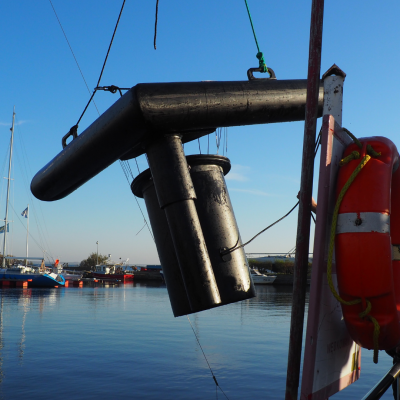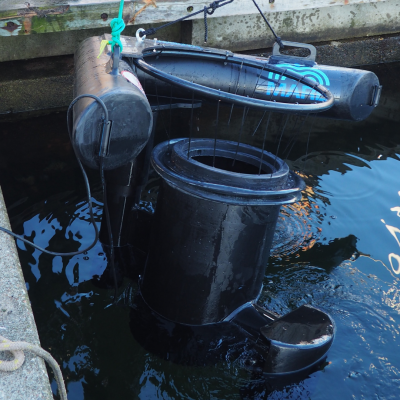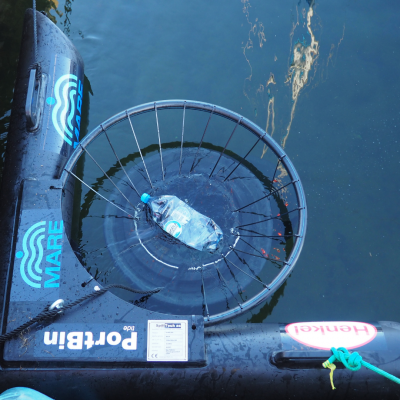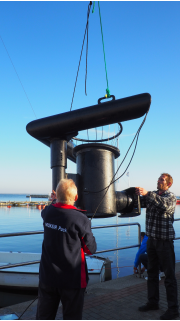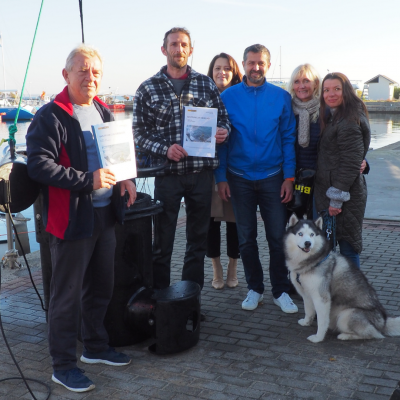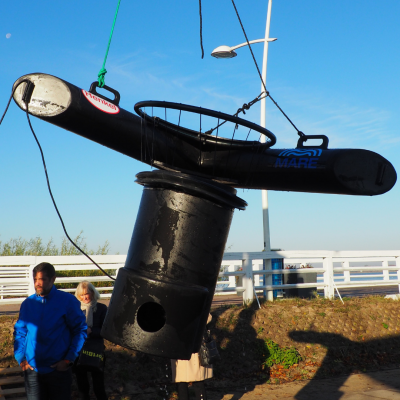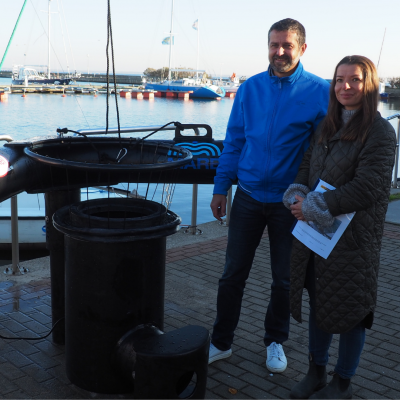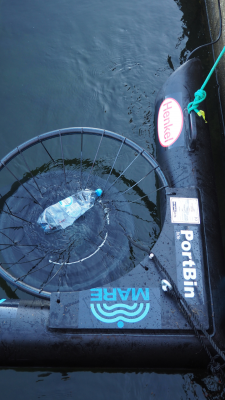Another marine litter bin at the Polish coast ? this time in Puck
4.8 to 12.7 million tonnes of plastic end up in the seas and oceans every year. The problem of plastic pollution has a global dimension and is also encountered in the Baltic. According to HELCOM, approximately 70% of waste found in the Baltic is plastic.
To help the Baltic, the MARE Foundation installs marine litter bins in Baltic ports. These bins are able to collect up to 1.400 kg of litter from water. Thanks to the cooperation with the Henkel company and the Sports Centre a new PortBin was installed in the Puck Marina. This is the fifth bin installed by the MARE Foundation this year!
In the last 70 years plastic has become an inseparable element of our everyday life. Plastic is used for the production of cars, computers, phones, in medicine and in construction works, almost in all areas of life. We depend on plastic because of low production costs, durability and convenience. However, its resistance to degradation, inadequate disposal and wide use as a single-use material resulted in an increasing amount of plastic in the environment, especially the marine environment.
The impact of plastic on the ecosystem, including the health of people and animals is the subject of extensive research in the world. Plastic waste is a highly heterogenous mixture of all types, sizes and forms, and all these factors are relevant to determine the environmental impact of plastic objects. Larger waste, such as derelict fishing gears may become deadly traps for marine living organisms. Smaller particles are often confused with food. They poison the living organisms, and impair the feeling of hunger, thus causing death from starvation.
Today we know that plastic does not decompose, but only breaks down into smaller and smaller particles, the so-called microplastic and nanoplastics. Due to their small size, microplastics are almost impossible to take out from the sea and remain forever in the ecosystem. They easily swallowed by living organisms and thus enter the food chain. Recently, microplastic particles have been found in drinking water and such food products as salt or honey. Research indicates that 94% of salt products tested globally contain microparticles of plastic – PET, PP and PE, the most often used polymers. The effects of microplastics on human health are not yet known.
The problem of plastic pollution has a global dimension and is also encountered in the Baltic. Therefore, the MARE Foundation undertakes actions aimed at minimising the plastic pollution in the Baltic. The installation of sea bins in ports and marinas permits to collect debris, which had entered the natural environment, before it reaches the sea bottom and breaks into microparticles.
- This marine litter bin, was financed by the Henkel company and installed in the Puck marina thanks to the cooperation of the local Sports Centre and the MARE Foundation. The is the sixth bin installed by the MARE Foundation this year. The MARE Foundation plans to continue and develop the project consisting of the installation of these bins. We believe that such bins should be installed in every marina and port on our coast, because it is an effective method to measurably improve the state of the environment. It also builds the public awareness on the impact of plastic on the marine environment. We are happy that thanks to the engagement and financial support of our business partners we can be even more effective in cleaning the Baltic – says Olga Sarna, the Chair of the MARE Foundation.
The SpillTech company has developed a complete line of high-tech products used for collecting floating garbage. PortBin is an optimal solution used to collect floating garbage in ports. PortBin collects debris floating on water surface into the bin. The skimmer removes floating bottles and other waste. PortBin is equipped with a 30 litre bin, easy to empty by one person. The bin is highly resistant to atmospheric conditions. This version of the PortBin is made of plastic PE-HD plastic and is 100% recyclable. In the future, the SpillTech company plans to produce the bins out of recycled material. PortBins are distributed in Poland by Scopus.
The bin was installed in the Marina in Puck. It was financed by the Henkel company in the framework of the cooperation to improve the state of the Baltic with the MARE Foundation. Laundry & Home Care Henkel Poland Department encourages consumers to make responsible choices during shopping, with Baltic environment in their minds. The action ”Give our children a clean Earth” is aimed at supporting the process of cleaning the Baltic from plastic waste.
In September and October, consumers buying Pro Nature products, as well as selected products by Persil, Silan, E, Somat, Bref, Colour Catcher, Perwoll Clin and Pur, supported the programme aimed at making the Baltic clean, implemented together with the MARE Foundation. Part of the income from these products was used for the purchase of a PortBin, used for removing litter from the surface of the Baltic.
Photos P. Nowakowska

